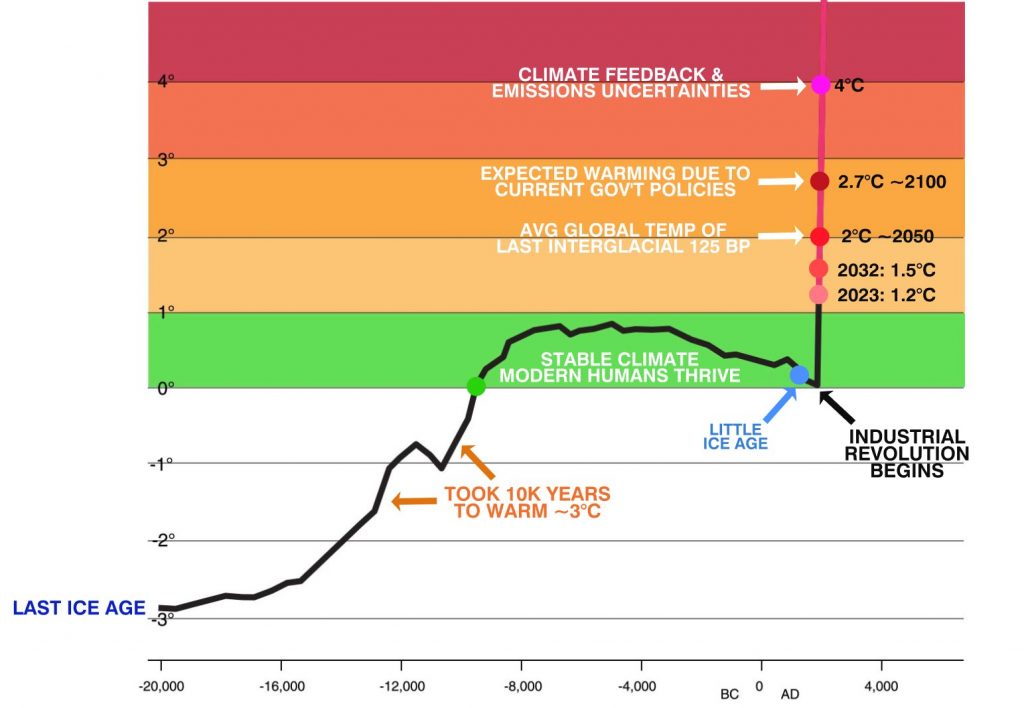Post by Meteorologist Nick Humphrey on FB, July 7, 2023,
Highlighted by NN Aug 15, 2025
It’s bizarre (or maybe it’s not) that no one talks about this but the rate of change of current global warming…averaging 0.2-0.25 C/decade…is greatly outpacing the ability of vertebrate lifeforms to keep up. Even if you accept the IPCC’s (likely) conservative projections on the global temperature rise, we’re basically talking a 3-4 C rise in temperature relative to pre-industrial, much of which will have occurred since the 1970s. A compression of change normally (in the ice age cycles) over thousands of years into 130-150 years. I hear climate scientists say we’re returning to these certain ancient climates from hundreds of thousands to millions of years ago. This is true. But, to do so over the course of just century or less is truly cataclysmic for complex biological organisms.
So, when I’ve, in the past, also heard some say, “well +4 C isn’t as bad as +6 C”, I scoff because, well +4 C just as a global temperature anomaly threshold is still by itself a hell world for current life adapted to interglacial conditions. But, the pace we’re taking to get there…is like taking life to the butcher house. It’s too damn fast. And humans are mammalian lifeforms who need other life to survive like any other mammal. We just can’t move our agriculture to different soils on a dime. Extinction rates are already accelerating because of other environmental issues (deforestation, for example). Rising by +4 C over 4,000 years would lead to extinctions. +4 C in 130 years? Or less? Life is resilient, but the more complex it is, the more it depends on other life to survive.
The fact that the pace of change and the effect on biology and ecology are never discussed is like a glaring hole in the climate conversations. People (and I’m guilty of this as well) post these graphs (see below) showing the monstrous spike in global average temperatures relative to tens of thousands of years of history, but the biological/ecological implications of that are just not thought about. We cannot ignore it though. The assumption that things will remain all hunky-dory (basically, we just have more weather disasters, but nature and us will be somehow fine as far as food, water, etc.) is absurd. But to have such a discussion would be a realization that maybe we’ve lost control of the situation more than we wish to realize.
Civilization is a fragile structure. Take away food (because of depleted agricultural production and the ecosystem processes ag depends on) and the whole deck of cards collapses. Ag was the whole reason civilization developed. And that’s just climate…set aside rapid topsoil losses globally, the rise in dead zones in the ocean, and the conquest of greater amounts of land (and deforestation) for agriculture and urbanization.
I’ve tried in recent years to remain somewhat optimistic about the future based on the fact that, well…I’m a scientist not a crystal ball. There’s a lot of uncertainties in our understanding of things. But, seeing what’s happening with climate over the past couple of years and especially this year, I realize the uncertainties seem to revolve more about timelines than the path itself. The path is ugly. And the result is the same whether it be 2030 or 2070. It’s in a blink of an eye as far as Earth is concerned. We need a miracle at this point and I’m not sure what that would be.
Sorry, the doom is hitting me hard this week, but I know what I know and what I see.

